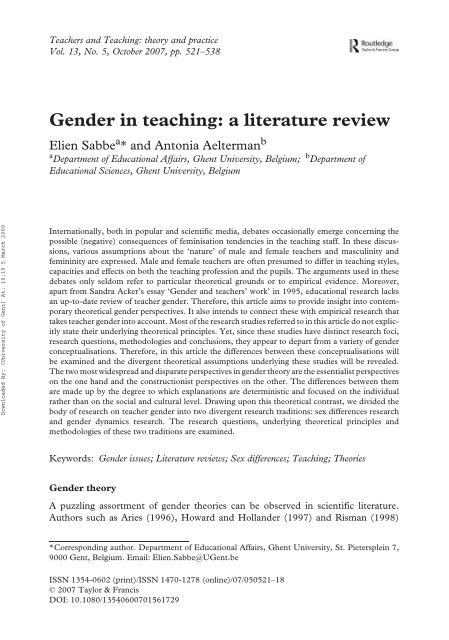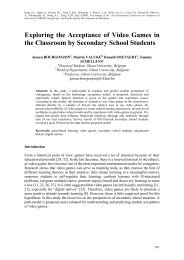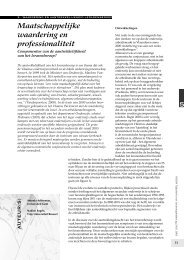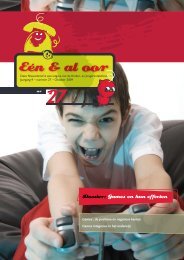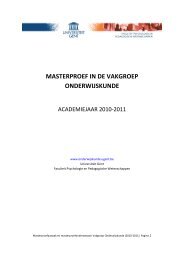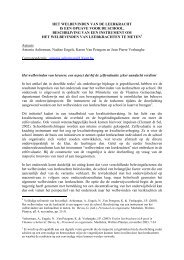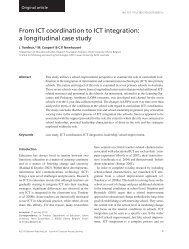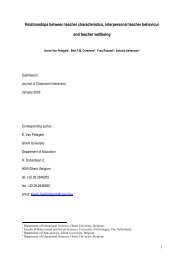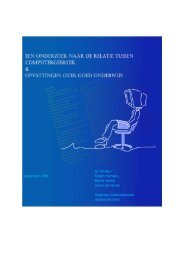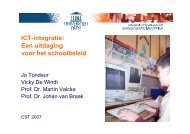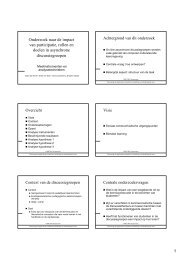PLEASE SCROLL DOWN FOR ARTICLE
PLEASE SCROLL DOWN FOR ARTICLE
PLEASE SCROLL DOWN FOR ARTICLE
Create successful ePaper yourself
Turn your PDF publications into a flip-book with our unique Google optimized e-Paper software.
Teachers and Teaching: theory and practice<br />
Vol. 13, No. 5, October 2007, pp. 521–538<br />
Gender in teaching: a literature review<br />
Elien Sabbe a * and Antonia Aelterman b<br />
a Department of Educational Affairs, Ghent University, Belgium; b Department of<br />
Educational Sciences, Ghent University, Belgium<br />
CTAT_A_256029.sgm<br />
10.1080/13540600701561729<br />
Teachers 1354-0602 Original 2007 Taylor 5000000October ElienSabbe elien.sabbe@ugent.be<br />
and & Article and Francis (print)/1470-1278 Teaching 2007 (online)<br />
Downloaded By: [University of Gent] At: 10:19 5 March 2009<br />
Internationally, both in popular and scientific media, debates occasionally emerge concerning the<br />
possible (negative) consequences of feminisation tendencies in the teaching staff. In these discussions,<br />
various assumptions about the ‘nature’ of male and female teachers and masculinity and<br />
femininity are expressed. Male and female teachers are often presumed to differ in teaching styles,<br />
capacities and effects on both the teaching profession and the pupils. The arguments used in these<br />
debates only seldom refer to particular theoretical grounds or to empirical evidence. Moreover,<br />
apart from Sandra Acker’s essay ‘Gender and teachers’ work’ in 1995, educational research lacks<br />
an up-to-date review of teacher gender. Therefore, this article aims to provide insight into contemporary<br />
theoretical gender perspectives. It also intends to connect these with empirical research that<br />
takes teacher gender into account. Most of the research studies referred to in this article do not explicitly<br />
state their underlying theoretical principles. Yet, since these studies have distinct research foci,<br />
research questions, methodologies and conclusions, they appear to depart from a variety of gender<br />
conceptualisations. Therefore, in this article the differences between these conceptualisations will<br />
be examined and the divergent theoretical assumptions underlying these studies will be revealed.<br />
The two most widespread and disparate perspectives in gender theory are the essentialist perspectives<br />
on the one hand and the constructionist perspectives on the other. The differences between them<br />
are made up by the degree to which explanations are deterministic and focused on the individual<br />
rather than on the social and cultural level. Drawing upon this theoretical contrast, we divided the<br />
body of research on teacher gender into two divergent research traditions: sex differences research<br />
and gender dynamics research. The research questions, underlying theoretical principles and<br />
methodologies of these two traditions are examined.<br />
Keywords: Gender issues; Literature reviews; Sex differences; Teaching; Theories<br />
Gender theory<br />
A puzzling assortment of gender theories can be observed in scientific literature.<br />
Authors such as Aries (1996), Howard and Hollander (1997) and Risman (1998)<br />
*Corresponding author. Department of Educational Affairs, Ghent University, St. Pietersplein 7,<br />
9000 Gent, Belgium. Email: Elien.Sabbe@UGent.be<br />
ISSN 1354-0602 (print)/ISSN 1470-1278 (online)/07/050521–18<br />
© 2007 Taylor & Francis<br />
DOI: 10.1080/13540600701561729


